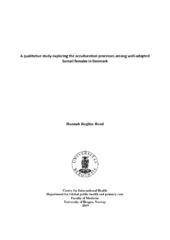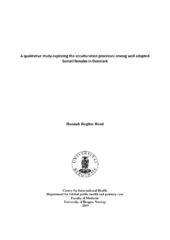| dc.description.abstract | Background: Research on Somalis in Europe tend to focus on poor integration and adaptation of the group into western societies. In Denmark, Somalis are highlighted as a migrant group impossible to integrate, resulting in the political agenda becoming increasingly radicalized and assimilation politics outlived. A Salutogenetic approach on well adapted Somali females in Denmark is an underlit research area which could provide valuable information for changing the migrant paradigm in Denmark. Methods: This was a qualitative descriptive study applying several in-depth interviews as sampling method. The aim was to explore the acculturation processes, including the concept of integration and adaptation of female Somali migrants in Denmark. This from a Salutogenetic perspective focusing on strengths and sense of coherence among the group. For analysing the data, thematic networks were applied and results were interpreted by applying Antonovsky´s salutogenetic theory, Sense of Coherence and existing relevant literature. Results: Integrating into Danish society is linked to fulfilling personal goals and Denmark is seen as a country full of possibilities migrants should take advantage of. Integration is perceived as socially strengthening and necessary, to move forward in life. The women see themselves as main role players and taking control over own life in order to fulfil dreams, is a matter of course. The women have a strong sense of Somali identity, which is shaped by a supporting upbringing and strong role models in their parents. Finally, Denmark is perceived as a country not necessarily suited for permanent settlement, should better options occur. Conclusions: Having life goals, social needs and an optimistic mind-set, helps shape the drive for these women to adapt into Danish society. The results support an existing study from Southern Spain, suggesting a shift in the political paradigm and discourse of migrants, could in fact, support greater integration over a larger migrant group. | en_US |

